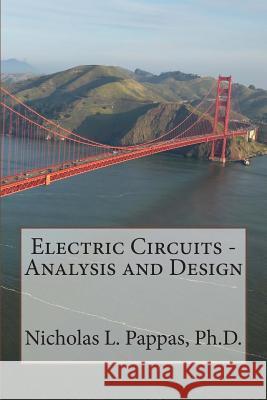Electric Circuits - Analysis and Design » książka
Electric Circuits - Analysis and Design
ISBN-13: 9781494273385 / Angielski / Miękka / 2014 / 326 str.
This university level text is for anyone who wants to know how to analyze and, in time, design electric and then electronic circuits with transistors in the next text in our series.
We do not use the devastating phrase "it is obvious," because nothing is obvious. Our emphasis is on very clear presentations.
The text includes experiments that give life to the text's contents, and provide you with real world experience.
This text gets the EE101 job done in about 300 pages at a reasonable price.
Once you have made your way through this text you will be able to do a node or mesh analysis of any linear circuit, while understanding resistors R, capacitors C, inductors L, transformers & mutual inductance M, as well as independent and dependent sources of current and voltage.
Furthermore design examples and procedures begin to show you the way to what really matters - being able to design.
You do not have to know anything about electricity to use this text, because the text starts with the brilliant experiments that discovered electricity, which revealed that electricity is charge q at rest and in motion. The experiments started up what has become the electronics business.
Then we show that there are two basic classes of laws (1) connection constraints, which are Kirchhoffs' laws showing how currents and voltages in any circuit relate to each other and (2) voltage-current vi constraints for resistors, capacitors and inductors showing how current relates to voltage in each component.
We explain capacitors C and inductors L as we derive their simple differential equation voltage-current constraints, which escalate the math required to the calculus.
Transformers based on mutual inductance M are explained as we derive their equivalent circuits and frequency response.
Two general analysis methods, node and mesh, are presented so that you can analyze any circuit. The node method is based on Kirchhoff's current connection constraint law, and the mesh method is based on Kirchhoff's voltage connection constraint law.
We show how to use the Laplace Transform Method to find any circuit's frequency response as well as the transient response. We show how straightforward the Laplace Transform is to use.
Frequency responses are important, because many circuit design goals are a specified over a range of frequencies.
Transient response shows how a circuit responds to signals.
Hendrick Bode invented a widely adopted method for making graphical displays of the magnitude and phase of the electric circuit frequency response equations generated by the Laplace Transform.
Here is something we have yet to see in any book. The reactance chart is a graphical display of the impedance magnitude of R, L, and C components over a frequency range. The log-log scales span many decades of magnitude and frequency on one page. We show how to use this eminently practical chart for making estimates and selecting "in the ballpark" values for components appropriate to the problem at hand.
We give the simulation program Spice a significant role in the text. Spice does the nitty gritty numerical calculations and data plotting for you. Spice is used in most chapters to calculate results and plot data. Spice has an important role in the modern design process.
Many useful ideas and important topics are found in the Appendix.
The good news is that a mathematical theory for analysis and synthesis is available. The mathematics takes several forms. There is the traditional form of written mathematics. There is Spice, a software form, using mathematics behind the scenes to evaluate circuit performance. And, there are Bode diagrams and Reactance charts that are graphical forms that convert electric circuit mathematics into comprehensible displays. We use all of these forms in the text.
We refer you to our blog npappasee.blogspot.com for additional information.
Zawartość książki może nie spełniać oczekiwań – reklamacje nie obejmują treści, która mogła nie być redakcyjnie ani merytorycznie opracowana.











